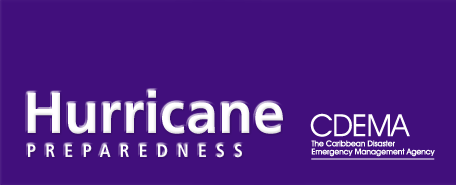|
The effects of hurricanes can be deadly.
Take hurricane season seriously!!
Year after year, hundreds of lives are adversely affected by natural disasters – they cause millions of dollars in damage, people are injured, homes destroyed, and lives are lost.
Although hurricanes may be difficult to predict or impossible to prevent, it is important to remember that you can still reduce the impact by being adequately prepared!
Hurricane season may make you feel anxious, but no worries! Here are a few tips to help you be hurricane ready.
Keeping Your Family Safe
Plan together to make sure that everyone knows what to do in the event of a hurricane.
- Make sure each family member (including children) knows how to turn off the electricity water and gas.
- Ensure that your family knows the nearest emergency shelters and evacuation routes, as well as the relevant emergency contact numbers in your country. Choose a location/meeting point for getting back together in case you get separated.
- Teach children how and when to call emergency departments, and show them which radio station to listen to for emergency information.
- Check to make sure that all flashlights and radios are working and purchase additional batteries. Stock up non-perishable foods and emergency supplies by creating a Hurricane Survival Kit.
- If you have any pets, please remember that many shelters may not take them. Create a Pet Plan to keep your fury loved ones safe this hurricane season.
Pet Plan
Pets also experience anxiety during hurricanes. Although their keen senses and instinct often aids in survival, they are still susceptible to the harm and stress that can be brought on by these natural events. Pets may not be allowed to stay with you in an Emergency Shelter if you have to evacuate; so make plans to board them at a kennel or Veterinarian. Remember, it is not safe to leave your pet in a vehicle during a hurricane.
If you have no choice but to leave your pets at home, here are a few points to help you keep your fury pals safe:
Food - Provide adequate food and water to last 2 weeks.
ID - Make sure that your pet is wearing a legible ID tag with information on dietary needs, health status, your name and address.
Location - Find a safe, ventilated room for them to stay in (without windows if possible).
Alertness - Your pet’s level of alertness increases their chance at survival. Do NOT administer medicines that will slow them down.
Potty time - Make provisions for your pet to relieve themselves. Provide cats with a large receptacle with cat litter. For dogs, set up a layer of plastic covered by a layer of newspaper in a flat rectangular box.
N.B - Do not leave livestock tied or fenced in. Set them free and if possible take them to an area of higher ground. For more information contact your local disaster office (www.cdera.org/ndccontact.php)
Keeping your home safe
Hurricanes can be costly. Protect your property to avoid unnecessary damage or loss.
- Check your insurance policy to know what it covers.
- Know the condition of your home by checking for any loose windows, roofing, doors etc. Make any necessary repairs and make your home more disaster resistant. Protect doors and windows by building shutters or assembling low-cost plywood panels. Use ½ inch plywood (marine plywood), pre-drill holes every 18 inches for screws and label panels so you know which window they belong to. Do this long before the storm. Remember that tape does not stop your windows from breaking.
- Trim all dead or weak branches on any trees on your property to avoid them falling onto your house during a hurricane.
- Place indoors any loose outdoor objects, and secure those which cannot be brought inside.
- Protect important documents by storing them in waterproof packaging.
Keeping your business safe
Hurricanes can be catastrophic, causing severe damage to businesses too. Develop a written hurricane preparedness plan and ensure that employees are trained in implementing it. Be prepared, put measures in place to help reduce the devastating effects!
- Create a staffing policy identifying any employees which should remain in office during the hurricane. This policy should also clearly state when staff will be released from work and when they are expected to return.
- Protect important documents and records such as accounts receivables, customer records, tax records and other administrative documents by storing them safely in waterproof packaging away from windows or exterior walls. Create back-up copies of documents on CDs, or portable storage devices (flash drives etc).
- Review your insurance policy to ensure that there is adequate coverage. Questions to ask include:
- Does the insurance package include wind/storm coverage?
- Is the facility located in a flood prone area and is the flood insurance adequate?
- Does the package include liability coverage for injury to employees as well as potential lawsuits from customers?
- Does the insurance cover damage to contents, including vital records and office equipment?
- Is the facility in a high hazard, evacuation area?
- Plan for the protection of the office by making any necessary repairs. Make sure that windows have shutters or wooden panels that can be used for protection, remove any debris from the surrounding area which could become missiles during a hurricane.
- Create a list of procedures and policies for all phases of hurricane operations:
- Pre-season Preparedness
- Hurricane Watch
- Hurricane Warning
- After the Hurricane
Hurricane Preparedness Tips For The Disabled
Everyone, including people with disabilities, should make time to prepare themselves this and every hurricane season. Having a disability or a special need can present challenges, but being prepared is always half the battle. If you or someone close to you has a disability, here are some steps to help you to be prepared for an emergency, and to plan for your survival or evacuation.
- Create a hurricane survivor kit or get someone to help you put one together. Store additional necessities such as prescription medication, catheters, wheelchair batteries, oxygen, etc. Make sure you store a Pet survival kit for service animals.
- Form a support network of persons that can come to your assistance. This could be family, friends, neighbours, or any organization which can provide support.
- Keep contact information for organizations with disability services and for persons in your support network nearby.
- Make sure others know how to operate assistance devices/equipment (e.g. wheelchair, hearing aid, etc). Make a list of the model number and type of equipment you use or will require.
- Create a list of things you need on a daily basis that you will specifically require during an emergency (medication, assistance devices, etc). Keep that list up-to-date and within easy access. Make sure that persons providing you with assistance refer to this list when helping you prepare or evacuate.
- Make plans for evacuation. Where will you go and who will transport you there?
- Wear a medical bracelet that lets people identify your disability or special needs.
- If you use or require a service animal, make sure that persons helping you to evacuate know that you will need to have your animal present.
- If you require some form of life sustaining equipment/treatment, make sure you know the location of more than one facility providing these services, in case you need assistance during an emergency.
For further information on preparedness for the disabled and elderly visit:
www.ready.gov/america/getakit/disabled.html
www.fema.gov/library/viewRecord.do?id=1442
See below for helpful downloads:
Preparing for Disaster for People with Disabilities and Other Special Needs 
|



























